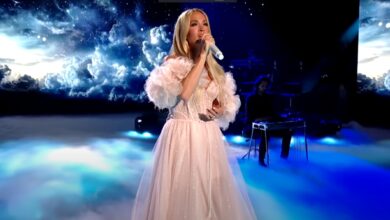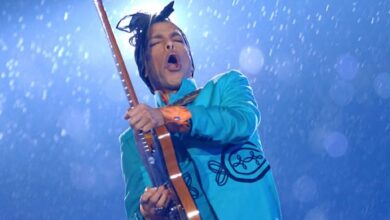Michael Bublé’s Heartfelt Tribute to Barry Gibb at the 46th Kennedy Center Honors Leaves the Audience in Tears
At the 46th Kennedy Center Honors, Michael Bublé paid a touching homage to Barry Gibb by performing the Bee Gees’ iconic track, “How Can You Mend a Broken Heart.” This heartfelt rendition not only celebrated Gibb’s remarkable career but also underscored the song’s lasting influence on music and its ability to evoke deep emotions.
Bublé’s performance was a masterful display of emotional artistry. His velvety voice and sincere delivery left the audience spellbound, with many moved to tears. Barry Gibb, the sole surviving member of the Bee Gees, was visibly touched, reflecting the profound personal connection and the song’s timeless significance.
Originally released in 1971 as the lead single from the Bee Gees’ album *Trafalgar*, “How Can You Mend a Broken Heart” marked the group’s first U.S. number one hit. Written primarily by Barry and Robin Gibb during a period of reconciliation after a family rift, the song carries a rich backstory that adds depth to its heartfelt lyrics and haunting melody.
The emotional and cultural impact of the song is undeniable. Its themes of heartbreak and healing have resonated with listeners across generations, offering comfort during times of personal loss. The universal appeal of its message has allowed it to transcend cultural and generational divides, making it a timeless anthem.
Bublé’s tribute at the Kennedy Center Honors breathed new life into the classic, reminding audiences of its enduring relevance. Such performances not only honor the original artists but also introduce these timeless tracks to younger listeners, ensuring their place in the ever-evolving tapestry of music history.
The song’s presence in modern culture remains strong, having been featured in numerous films and TV shows. Its inclusion in soundtracks often accompanies pivotal emotional scenes, further solidifying its status as a cultural touchstone. This continued relevance highlights the song’s ability to connect with audiences in profound ways.
In recent years, platforms like TikTok have sparked a renewed interest in classic songs, with younger generations discovering and sharing tracks from past decades. “How Can You Mend a Broken Heart” has found a new audience through user-generated content, bridging the gap between eras and proving its timeless appeal.
The Bee Gees’ legacy is one of unparalleled songwriting and emotional resonance. Their ability to craft melodies that speak to the human experience has cemented their place in music history. This particular song stands as a testament to their genius, capturing the essence of love, loss, and healing.
Michael Bublé’s interpretation of the classic showcased his unique artistry while staying true to the original’s spirit. His smooth, emotive delivery added a fresh layer of depth to the song, demonstrating its versatility and capacity to be reimagined across genres.
The audience’s reaction to Bublé’s performance was a mix of nostalgia and admiration. Many were visibly moved, a testament to the song’s powerful lyrics and melody. Barry Gibb’s emotional response further underscored the personal significance of the moment, making it a highlight of the evening.
Over five decades since its release, “How Can You Mend a Broken Heart” continues to inspire artists and listeners alike. Its universal themes ensure its enduring influence, with countless covers and reinterpretations paying homage to its timeless message.
The song’s resurgence in modern media, from films to viral videos, has introduced it to new audiences, ensuring its continued relevance. This cultural revival allows the track to remain a source of comfort and inspiration for listeners worldwide.
Tributes like Bublé’s performance play a vital role in preserving the legacy of classic songs. They serve as a bridge between generations, honoring the original artists while introducing their work to new listeners. Such moments highlight the timeless nature of well-crafted music and its ability to transcend time and space.
Reflecting on performances like Bublé’s encourages us to revisit classic tracks and appreciate their artistry. Sharing these moments fosters a collective appreciation for music’s enduring power and its role in capturing the complexities of the human experience.
If you haven’t yet experienced Michael Bublé’s heartfelt tribute to Barry Gibb, it’s a performance that encapsulates the magic of live music and the enduring appeal of a classic song. Witnessing such moments reminds us of music’s unparalleled ability to connect, heal, and inspire.



